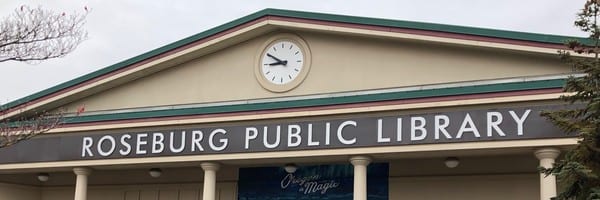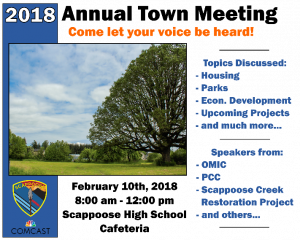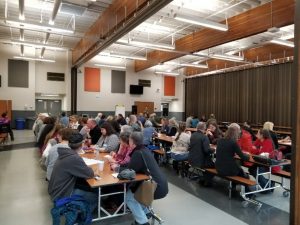When the Douglas County Library System closed in 2017, it left eleven holes in eleven towns. While still nicknamed “The Timber Capital of the Nation”, dwindling funds from timber revenue had tightened wallets in the Douglas County government, putting library funding on the chopping block. In a last-ditch effort to keep the libraries open, a ballot measure proposing a property tax increase was put to the vote. The community soundly voted against it.
The collapse of the library system made its way through local, state, and national news. Many questioned the purpose of libraries in today’s world, arguing that Amazon and digital technology have made their place in society obsolete. Many more were shocked at the thought that residents of a county the size of Connecticut would be left without library services.
In the year that followed the closure, many of the libraries managed to reopen their doors. With little-to-no funding, they relied entirely on volunteers and donations to run. However, the Roseburg branch, which had previously been the main library for the whole county, remained unopened. Behind its doors, the bulk of the materials that had circulated throughout all 11 libraries sat gathering dust on the shelves. It took Roseburg residents passing a city property tax increase, an agreement with the Douglas ESD to convert part of the building into their office space, as well as multiple large donations from state and local foundations, to finally make the library reopening a possibility.
 I was thrown headfirst into the library reopening project through the RARE AmeriCorps Program as my first job out of college. I had little knowledge of how libraries were run, much less what it took to start one from the ground up. After 4 months of delays, uncertainty, and buildup, the Roseburg Public Library project was finally completed on January 10, 2019. While I am far from a library professional, my position has granted me insight into an unusual process that few have the opportunity to be a part of. These are the main lessons I have learned so far in my term of service:
I was thrown headfirst into the library reopening project through the RARE AmeriCorps Program as my first job out of college. I had little knowledge of how libraries were run, much less what it took to start one from the ground up. After 4 months of delays, uncertainty, and buildup, the Roseburg Public Library project was finally completed on January 10, 2019. While I am far from a library professional, my position has granted me insight into an unusual process that few have the opportunity to be a part of. These are the main lessons I have learned so far in my term of service:
- Introduce yourself to the key players. Get to know everyone involved in the project, from the construction workers and architects to the library volunteers and old employees. Sit in on meetings even when you don’t understand what is going on, because eventually you will.
- Be patient. Sometimes things our out of your hands and happen at their own pace. Be hopeful but realistic about deadlines with yourself and others who rely on you as a source of information.
- Speak up. Your ideas are valid, even compared to the ideas of those who are more experienced and older than you. Just because something has always been done this way does not mean it is the best way going forward.
- Know when to engage. Everyone has opinions, and many will want to make their opinions heard. When changes have to be made, opinions will sometimes be negative. Don’t take it personally. Strategize by mainly pushing out information to the public instead of responding to every individual question or complaint.
- Focus on the end goal. Seeing how thankful the community is to have a library again will make all the hard work worth it.
- Each day is a new battle. Once you open, expect multiple things to go wrong each day. The self-checkout and printer will stop working, books will go missing, and volunteers will fall off the face of the earth. Eventually it will be figured out, and you’ll finally be able to take a breath and answer some emails.
A bit about the author, Adrienne Groves:
- Currently serving as Community Outreach Coordinator for the Roseburg Public Library.
- Adrienne earned a bachelors degree in Environmental Studies-Biology from Whitman College
- People may be surprised… “I was an Editor‐in‐Chief of my college’s literary arts magazine blue moon.”


